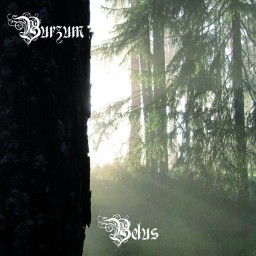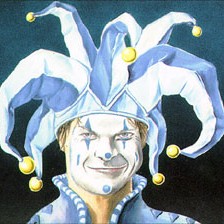Reviews list for Burzum - Belus (2010)
An effective return to atmospheric black metal that's a bit too inconsistent to match the Burzum classics.
In May 2009, Varg Vikernes was released from prison after serving almost sixteen years of a twenty-one year murder sentence. I have no shame, despite holding no respect for the man’s actions and beliefs, in admitting that this was an exciting occasion for me personally. Finally, after being subjected to two fairly awful ambient albums that Varg produced while imprisoned, there was the possibility of hearing new Burzum material the way it was meant to be experienced. However, as much excitement as this idea brought with it, I couldn’t help but be apprehensive about what was to come. Could my expectations possibly be met, or was I in for a crushing letdown? Things certainly looked positive when Varg announced that the new album would indeed be one based in black metal, and that it would be of a similar style to two of my favourite albums, Hvis Lyset Tar Oss and Filosofem. It would even contain some old unreleased tracks, suggesting that it very well could hold the same atmospheric and at times ambient black metal that I so strongly connected with in my youth (and still do). In November 2009, Varg announced that the title of the upcoming album was to be Den hvite guden (which translates as The White God), which immediately attracted the one thing that has never been far from the man, even when he tries to avoid it. Controversy!
The backlash that this title prompted was due to its perceived racist nature. While Varg has stated time and time again that the selected title had no connection to skin colour, and in fact was simply referring to one of the many names that the god Baldr goes by, the media was having none of it. Seeing another chance to lynch Varg, just as they did over fifteen years ago with bogus Satanism claims, they attacked him heatedly. None of this was surprising of course, but then something happened that I’m absolutely certain would not have occurred prior to Varg’s incarceration. In December 2009, he announced that he was changing the album title to Belus. Stating that he wished to “take away their excuse to spread their anti-Varg/anti-Burzum hate-propaganda when (and before) the album is released”, this came as quite a surprise given Varg’s history of caring nothing for general opinion towards his music or person. It also seems baffling that cries of racism would really concern him, given that he has made numerous suggestions over the years that other races are inferior to his own. How can someone that makes statements like “the other races are rejects, and there is nothing to improve. They are like old 286 or 386 computers, that cannot be upgraded sufficiently anyhow, so we throw them on the scrap heap instead” be offended by the label racist?
You want to know where Varg got his theory of superiority from?! Ironically, it comes from the same mythology that portrays his beloved White God, so no variation in the album title is going to make it any better. Part of that story describes how the heavenly father Óðinn ordered his son Heimdallr to create a worthy race of men. Heimdallr first created a race known as Thrall’s kin that had black and wrinkled skin, ugly faces, bent backs, crooked noses and long heels. Clearly not satisfied, he then made a race named Free Men’s kin, who had red faces, red-brown hair and watchful eyes. Still not satisfied, he created the Noble’s kin, who had blonde hair, fair skin and fair eyes as sharp as those of a dragon. Finally happy with his son’s work, Óðinn sent Heimdallr to Earth to teach the nobles, and it is only this race (the European race) that is allowed to sit with Óðinn in the halls of heaven. Apparently Heimdallr then placed a throne over the North Pole (between Heaven and Hell), from where he would watch over his chosen race, visiting them yearly on The Winter Solstice. This complete nonsense, which is clearly no more convincing than the Christian lies that Varg so despises, is where many of his life values have been taken from, so it’s hardly surprising that the man is lacking in the empathy department.
So Belus was to be the new name of this long awaited album, which from what I can gather is just another name for the same god that the album Dauði Baldrs described, otherwise known as Baldr, Belenos and of course, the White God. The album apparently explores the ancient European myths concerning his death, his journey through the underworld and his return. That narrative sounds almost identical to that of Dauði Baldrs, which isn’t the only connection between the two releases. After a short intro called Leukes Renkespill (The Intrigues of Leuke), that sounds like someone knocking over beer bottles, Belus kicks off with the title track off Dauði Baldrs, this time in metal form and given the title Belus' Doed (Belus’ Death). I shouldn’t have been surprised given that Varg had stated numerous times that the tracks off both of the ambient albums recorded from prison were based around black metal tracks he wrote back in 1993, and he’d also stated his intention to record at least one of them in its originally intended form for the first album after his release. After I got over the initial negative nostalgia, it was actually been quite neat to hear how things could have panned out if Varg hadn’t gone all Norwegian Psycho and killed Euronymous. It’s a decent start to the album and contains that grand, hypnotic element that I really hoped would be present on Belus.
Varg’s vocals are a bit different to the way they were on previous Burzum outings. Belus contains neither the tortured shrieks found on the early albums, nor the massively distorted, effects rich style of Filosofem. This is probably the most “normal” his voice has sounded since Burzum’s inception and I think that’s a positive (it’s far more controlled) and a negative (it lacks the sheer emotion and impact). Third track Glemselens Elv (River of Forgetfulness) also displays a low chant-like addition which works perfectly well within the mesmerising framework. While things don’t change dramatically over this track’s near twelve minute running time, it proves that Varg can still create epic and atmospheric pieces of music. There is one thing that becomes very apparent at this stage though and that’s the lack of emphasis given to the drums. Not only are the drums very low in the mix and therefore lacking in power, they’re also performed in an extremely simplistic manner. There’s no doubt that this aspect has never been Varg’s strongest attribute, but it appears he decided to push them right to the back to hide the inadequacies of his skills. It’s either that or he’s just a bit rusty after years of sitting in a cell reading books and playing with his laptop. It’s not so much a flaw as it is an observation though, as this style of black metal simply doesn’t require huge technical percussion skills to function well enough.
The first sign of aggression comes with Kaimadalthas' Nedstigning (Kaimadalthas' Descent) which starts off well with a cool riff and some hostile vocals, before things take a turn for the worse. The repeated spoken word element really doesn’t work, drawing far too much attention to itself while not fitting the tone of its surroundings. To make matters worse, the track introduces a rocking riff halfway through that completely undoes the violent groundwork of the first half. This track is the first disappointing aspect of Belus and unfortunately it’s followed by undoubtedly the lowest point of the album. My excitement that Varg was going to perform an unreleased track from early in his development completely backfired on me, with Sverddans’ (Sword’s Dance) shitty thrash attack making any concerns I had about Kaimadalthas' Nedstigning seem entirely redundant. Originally written back in 1988 when Varg’s one man band was known as Uruk-Hai, Sverddans wouldn’t have been particularly good back then, let alone as part of a modern sounding Burzum album. On my first listen through of Belus, I’d started to think by this stage of the album that Varg had rushed this release out. The album was degenerating quickly and needed something special to stop the rot. Thankfully, that’s exactly what we get, with the last three tracks bringing Belus home in style.
First there’s Keliohesten (The Kelio Horse), that’s undoubtedly Belus’ most successful attempt at the faster black metal Burzum approach. Just as on the title track on Hvis Lyset Tar Oss and Jesus' Tod on Filosofem, Keliohesten utilises breakneck drumming and a cool tremolo picked riff to build an atmosphere of epic majesty. It doesn’t quite manage to match either of those classics though due to Varg’s less impactful vocals and a secondary riff that once again ventures into thrash territory, but it’s a pretty good attempt that proves that Burzum is far from dead and buried when it comes to intensity. Then there’s Morgenrøde (Dawn), which is undoubtedly the highlight of Belus for me. I’ve listened to this track daily for the past two weeks and it’s clawed its way into my subconscious in a way that few bands can manage. This is ambient black metal in the style that made Filosofem so incredibly captivating, and it really takes this album to a whole new level on its own. By the time Morgenrøde settles into a hypnotic instrumental rhythm for the last few minutes, I’m off on some distant journey to lands far away, just as Varg no doubt intended. It all leads perfectly into closer Belus' tilbakekomst (The Return of Belus).
On his website, Varg states that “if I can make you dream when listening to this album, I believe I have done a good job", and I think the combination of Morgenrøde and Belus' tilbakekomst are where he undoubtedly achieved this goal. This final near ten minute ambient instrumental takes the hypnotised state that Morgenrøde left me in and holds me there, powerless to break away from its grasp. This isn’t one of those keyboard based ambient tracks that can be found on previous Burzum works however. Belus' tilbakekomst is layers of distorted guitar, backed by heartbeat-like drumming that very gradually shifts before fading the album away into nothingness. It’s a beautiful ending to an inconsistent album, and these final tracks not only make Belus worthwhile to me, but also give me real hope that the next Burzum album might yet reach the high expectations that this one has just fallen short of. There is no sign of anything on the horizon just yet, but let’s hope it finds its way into our hands before that certain-to be-complete-garbage Hollywood movie (based on the book Lord of Chaos), that will undoubtedly make a farce of everything surrounding this mad genius, hits movie screens around the world. To think that a guy from the atrocious Twilight series could be hired to play such a complex and disturbing character really shows how messed up this world is right now.


 Ben
Ben